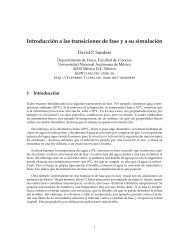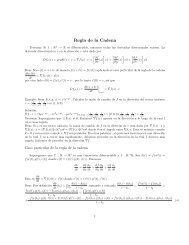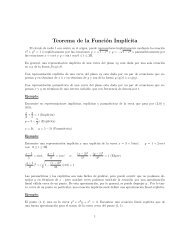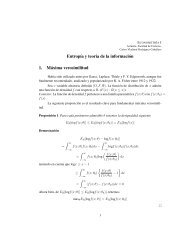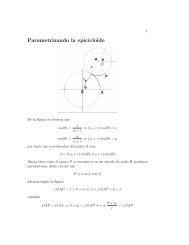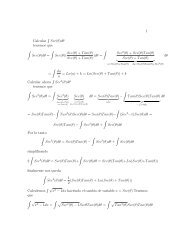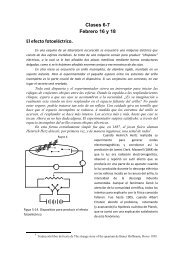"Surely You're Joking, Mr. Feynman!" - unam.
"Surely You're Joking, Mr. Feynman!" - unam.
"Surely You're Joking, Mr. Feynman!" - unam.
You also want an ePaper? Increase the reach of your titles
YUMPU automatically turns print PDFs into web optimized ePapers that Google loves.
then there was something else. And underneath each picture it said, "What makes it go?"<br />
I thought, "I know what it is: They're going to talk about mechanics, how the<br />
springs work inside the toy; about chemistry, how the engine of the automobile works;<br />
and biology, about how the muscles work."<br />
It was the kind of thing my father would have talked about: "What makes it go?<br />
Everything goes because the sun is shining." And then we would have fun discussing it:<br />
"No, the toy goes because the spring is wound up," I would say.<br />
"How did the spring get wound up?" he would ask.<br />
"I wound it up."<br />
"And how did you get moving?"<br />
"From eating."<br />
"And food grows only because the sun is shining. So it's because the sun is<br />
shining that all these things are moving." That would get the concept across that motion<br />
is simply the transformation of the sun's power.<br />
I turned the page. The answer was, for the windup toy, "Energy makes it go."<br />
And for the boy on the bicycle, "Energy makes it go." For everything, "Energy makes it<br />
go."<br />
Now that doesn't mean anything. Suppose it's "Wakalixes." That's the general<br />
principle: "Wakalixes makes it go." There's no knowledge coming in. The child doesn't<br />
learn anything; it's just a word!<br />
What they should have done is to look at the windup toy, see that there are<br />
springs inside, learn about springs, learn about wheels, and never mind "energy." Later<br />
on, when the children know something about how the toy actually works, they can<br />
discuss the more general principles of energy.<br />
It's also not even true that "energy makes it go," because if it stops, you could say,<br />
"energy makes it stop" just as well. What they're talking about is concentrated energy<br />
being transformed into more dilute forms, which is a very subtle aspect of energy. Energy<br />
is neither increased nor decreased in these examples; it's just changed from one form to<br />
another. And when the things stop, the energy is changed into heat, into general chaos.<br />
But that's the way all the books were: They said things that were useless, mixed<br />
up, ambiguous, confusing, and partially incorrect. How anybody can learn science from<br />
these books, I don't know, because it's not science.<br />
So when I saw all these horrifying books with the same kind of trouble as the<br />
math books had, I saw my volcano process starting again. Since I was exhausted from<br />
reading all the math books, and discouraged from its all being a wasted effort, I couldn't<br />
face another year of that, and had to resign. Sometime later I heard that the energy<br />
makesitgo book was going to be recommended by the curriculum commission to the<br />
Board of Education, so I made one last effort. At each meeting of the commission the<br />
public was allowed to make comments, so I got up and said why I thought the book was<br />
bad.<br />
The man who replaced me on the commission said, "That book was approved by<br />
sixtyfive engineers at the Suchandsuch Aircraft Company!"<br />
I didn't doubt that the company had some pretty good engineers, but to take sixty<br />
five engineers is to take a wide range of ability and to necessarily include some pretty<br />
poor guys! It was once again the problem of averaging the length of the emperor's nose,<br />
or the ratings on a book with nothing between the covers. It would have been far better to



